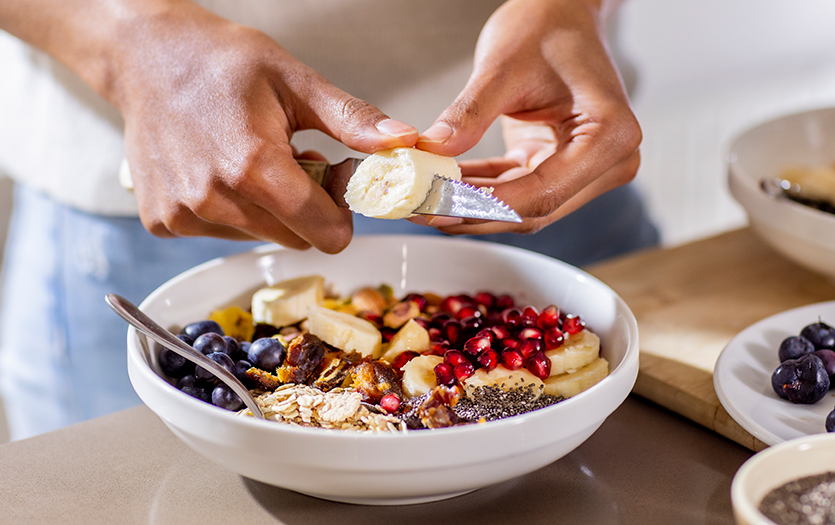Between the good, the bad, and the triglycerides, establishing that magic cholesterol combination can be quite the riddle. In honor of National Cholesterol Education Month, we invited you to submit your questions related to the subject and secured a top authority on the topic to provide the answers.
Q. What are the best foods to eat to lower cholesterol?
A: “The current recommendations for lowering and maintaining cholesterol levels are plenty of fresh fruits and vegetables, fish (deep water, oily fish like salmon, tuna and cod are high in Omega-3 fatty acids that help with cholesterol) and poultry. Red meats can be eaten in moderation but should be lean cuts and limited to 1-2 times per week.” – Mark O’Shaughnessy, MD
Q: What foods should I avoid if I have high cholesterol?
A: “Limit red meats to 1-2 times per week, avoid or moderate high-cholesterol foods such as bacon, organ meats like liver/brain and avoid fried foods (especially if fried with trans fats or saturated oils). Saturation of fats refers to the amount of hydrogen atoms that are attached to the carbon backbone of the fat (the more hydrogen atoms the more saturated the fat and the worse effect it has on our vascular systems).” – Dr. O’Shaughnessy
Q: What are triglycerides and how do I lower them?
A: “Triglycerides are another form of fat in our bodies. Basically, oil and water do not mix; Most of our blood is water and cholesterol and fats are, of course, fat, so the body will package these compounds into special ‘envelopes’ to allow these important compounds to move throughout our bodies via the blood stream without forming fat droplets in our blood. Cholesterol and triglycerides, along with several other forms of fatty compounds, are very important to the proper functioning of our bodies, but when these compounds are in excess, they get deposited into our tissues and cause harm. Lowering triglycerides can be done with the dietary measures mentioned above, moderate exercise and limiting ‘simple sugars’ (sweets).” – Dr. O’Shaughnessy
Q: Is cholesterol really tied to genetics?
A: “Indeed, cholesterol metabolism is inherited and a great deal of our cholesterol is related to our parents. This is not an excuse to eat anything we like just because we ‘chose the wrong parents.’ Dietary and environmental factors play a major role in our cholesterol as well, and are things we can truly impact.” – Dr. O’Shaughnessy
Q: After weight loss or trying a new medication, how long will my doctor wait to retest me?
A: “Typically, we will recheck the cholesterol 3-6 months after a significant lifestyle modification (diet and exercise) or medication adjustment.” – Dr. O’Shaughnessy
Q: How does weight impact my cholesterol?
A: “Weight, or more specifically excess weight, does indeed play a role in excess cholesterol. There is something called metabolic syndrome where an overweight (obese) person has high cholesterol, diabetes, hypertension and blood that clots easily (all a ticking time bomb for cardiovascular events). This condition is due exclusively to weight. Lose the weight and all the abnormalities resolve. It should be noted that just because someone is ’skinny’ or not overweight, that does not mean his or her cholesterol is not a problem. You can’t judge a book by its cover, so it is very important to have your cholesterol checked regularly by your physician. Know your numbers!” – Dr. O’Shaughnessy
Q: What if I have low LDL and low HDL?
A: “Cholesterol is packaged in protein envelopes so it can move around our bodies without forming fat globules in our blood. LDL stands for (low density lipoprotein) and is the bad guy (Lousy cholesterol). HDL stands for (high density lipoprotein) and is the good guy (Happy cholesterol). LDL in excess gets deposited in our blood vessels causing vascular disease (heart attack and stroke), while HDL goes and snarfs up the bad cholesterol from the vessel walls and returns it to the liver for processing. The best way to raise HDL is moderate exercise.” – Dr. O’Shaughnessy
Q: At what age should we start getting cholesterol checked?
A: “You should having your cholesterol checked at age 18 and periodically thereafter based on your individual risk factor profile, which can be best determined by the primary care physician.” –Dr. O’Shaughnessy



